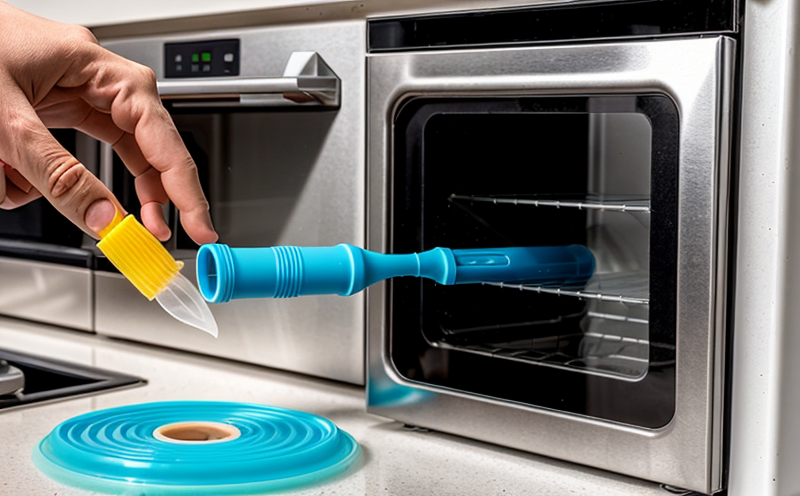ASTM D2863 Flammability Testing of Household Plastics
The ASTM D2863 standard specifies a method for measuring the flame spread characteristics and the burning behavior of household plastics. This test is essential in ensuring that household items made from plastic materials comply with safety regulations, particularly concerning fire hazards. The procedure involves placing a specimen on an inclined surface and subjecting it to a controlled flame source under specific conditions.
The purpose of ASTM D2863 testing is to evaluate the flammability properties of plastics commonly found in household products such as furniture, toys, and electronics. This test helps manufacturers determine whether their materials meet safety requirements before production or market release. Compliance with this standard ensures consumer protection against potential fire risks associated with poorly designed or manufactured plastic items.
The testing procedure typically follows these steps:
- Preparation of the specimen according to ASTM D2863 specifications
- Setting up the apparatus as per the standard's requirements
- Illuminating the sample with a controlled flame for a specified duration
- Maintaining temperature and time parameters within strict limits
- Observing and recording the burning behavior of the specimen during and after ignition
The outcome of ASTM D2863 testing provides critical data on how fast flames travel across a surface, how easily it ignites, and whether it self-extinguishes once removed from direct flame. These results are crucial for product development teams to refine designs or select safer materials if necessary.
Understanding the implications of this test requires some knowledge about polymer chemistry and combustion science. For instance, certain additives like brominated flame retardants can significantly influence the flammability properties of plastics. By conducting ASTM D2863 tests early in the design process, companies can make informed decisions regarding material selection and formulation.
Regulatory bodies around the world often reference ASTM standards when setting national or international safety guidelines for household goods. Therefore, ensuring compliance with ASTM D2863 not only enhances product quality but also facilitates smoother market entry into various jurisdictions.
Scope and Methodology
The scope of ASTM D2863 encompasses the evaluation of the flame spread characteristics and burning behavior of household plastics. Specifically, this test assesses how quickly flames move across a horizontal or vertical surface made from these materials. The methodology involves placing specimens on an inclined panel, exposing them to a controlled flame for a predetermined period, and measuring various parameters such as distance traveled by the flame front.
The testing apparatus used in ASTM D2863 includes an inclined panel with a built-in calorimeter to measure heat release rates. Other essential components are a propane burner capable of providing a steady flame source and a timer to control exposure times accurately. Specimens must be prepared according to detailed instructions outlined in the standard, including dimensions and orientation.
The procedure begins by positioning the specimen on the inclined panel at a specified angle. The flame is then applied to one end of the sample for a set duration, after which time the rate of flame spread is measured using laser technology or other appropriate methods. Additional data collected includes the maximum vertical height reached by the flame and any residual burning effects observed post-test.
Acceptance criteria vary depending on the specific application of the plastic being tested. Typically, lower values indicate better performance regarding fire resistance; however, these thresholds depend on industry standards and local regulations. Compliance with ASTM D2863 ensures that household products do not pose unreasonable risks due to insufficient flammability properties.
Eurolab Advantages
EuroLab offers comprehensive services for conducting ASTM D2863 flammability tests on household plastics, leveraging cutting-edge equipment and experienced personnel. Our state-of-the-art laboratories are equipped with specialized instruments designed to meet the highest accuracy standards required by this test method.
Our team of experts has extensive experience in polymer science and flame retardant technology, ensuring precise specimen preparation and consistent experimental conditions across all tests. This expertise translates into reliable results that can be trusted for regulatory submissions or internal quality control purposes.
We pride ourselves on providing personalized service tailored to our clients' needs. Whether you require single samples tested quickly or large batches processed over extended periods, EuroLab ensures efficient turnaround times without compromising accuracy or thoroughness. Our commitment to excellence extends beyond just technical proficiency - we also emphasize clear communication throughout the testing process, offering detailed reports complete with visual aids when requested.
In addition to ASTM D2863 flammability testing, EuroLab provides a wide range of other services related to polymer and plastics testing, including mechanical property assessments, chemical analysis, and custom formulations. By integrating these capabilities into our offerings, we aim to support your entire product development lifecycle from concept through final production.





